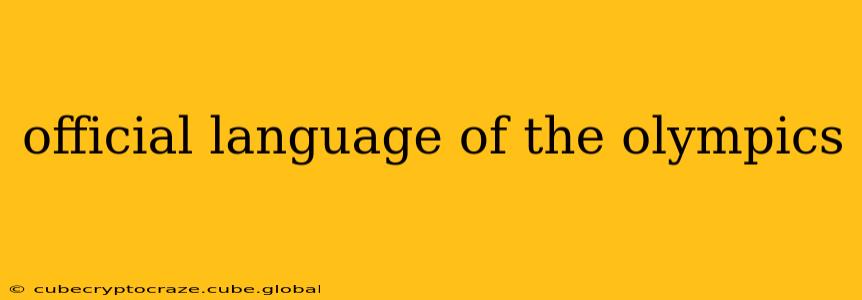The Olympic Games, a global spectacle uniting athletes and spectators from across the world, naturally raises the question: what is the official language of the Olympics? The simple answer is not as straightforward as you might think. There isn't a single, solitary official language. Instead, the International Olympic Committee (IOC) uses a multilingual approach, employing several languages to ensure effective communication and inclusivity. This article will delve into the complexities of Olympic language, addressing common questions and providing a clear understanding of the linguistic landscape of this international event.
What are the working languages of the IOC?
The International Olympic Committee operates primarily using English and French. These two languages are considered the working languages of the IOC, meaning all official documents, communications, and meetings are conducted in, or translated into, these two languages. This dual-language approach reflects the historical significance of both English and French in international diplomacy and organizations. The choice also reflects the geographic diversity of the IOC's membership and the global reach of the Olympic movement.
Is there only English and French? Why other languages aren't official?
While English and French are the primary working languages, the IOC recognizes the importance of other languages, especially during the Games themselves. The host country's official language(s) play a significant role in local communication and event organization. For example, during the 2020 Tokyo Olympics, Japanese was extensively used alongside English and French. The reason other languages aren't designated as official working languages comes down to practicality and maintaining a consistent, manageable system for international communication within the IOC itself. Having too many official languages would significantly increase the cost and complexity of official operations.
What languages are used during the Olympic Games?
During the Olympic Games, the linguistic environment is significantly broader than the IOC's official working languages. The host city and country's languages are prominently featured in signage, announcements, and volunteer support. Additionally, given the global nature of the event, many other languages are spoken by athletes, spectators, and media personnel. The IOC strives to accommodate this linguistic diversity through translation services and multilingual signage, ensuring accessibility for as many participants as possible.
Are announcements made in multiple languages?
Yes, while the precise number and selection of languages vary based on the host city and the specific event, announcements are typically made in multiple languages to ensure that as broad an audience as possible can understand. This usually includes English, French, and the host country's language(s), at minimum.
How does the IOC manage communication in so many languages?
The IOC uses a sophisticated system to manage communication across various languages. This includes employing a large team of translators and interpreters, utilizing translation software and services, and coordinating communication strategies across different linguistic communities. The goal is to bridge the communication gap and promote inclusivity among all stakeholders involved in the Olympic Games.
Why is multilingualism important for the Olympics?
Multilingualism is paramount to the Olympic Games' success. It facilitates communication among diverse participants, ensures the inclusivity of athletes and spectators from around the globe, and allows for the effective dissemination of information and crucial announcements. It reflects the Olympic ideals of global unity and cooperation.
In conclusion, while English and French are the official working languages of the IOC, the Olympic Games are a truly multilingual event, leveraging the host country’s languages and employing diverse communication strategies to create a welcoming and inclusive atmosphere for all. The emphasis is on effective communication, accessibility, and celebration of global linguistic diversity.
